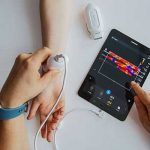Introduction: The Growing Importance of Portable Medical Devices in Home Healthcare
In recent years, there has been a significant shift in healthcare delivery from traditional hospital settings to the comfort and convenience of patients’ homes. This transition has been made possible, in large part, by the advent of portable medical devices. These devices, ranging from blood pressure monitors to glucose meters, have revolutionized patient care by allowing individuals to monitor their health conditions and receive necessary treatments without the need for frequent hospital visits.
Advantages of Portable Medical Devices for Patients and Caregivers
One of the primary advantages of portable medical devices is the increased independence they provide to patients. By allowing individuals to monitor their health conditions at home, these devices empower patients to take control of their own care. For example, a patient with diabetes can use a portable glucose meter to regularly check their blood sugar levels, enabling them to make informed decisions about their diet and medication. This not only improves the patient’s quality of life but also reduces the burden on caregivers, who no longer need to constantly supervise and assist with these tasks.
Furthermore, portable medical devices offer convenience and cost savings for patients. Instead of making frequent trips to the hospital or clinic for routine check-ups, patients can now perform these tests at home. This not only saves time and money but also reduces the risk of exposure to infectious diseases, particularly important in the current COVID-19 pandemic. Additionally, portable medical devices can transmit data directly to healthcare providers, allowing for remote monitoring and timely interventions. This real-time data exchange enhances the efficiency of healthcare delivery and enables early detection of potential health issues.
Challenges and Limitations of Portable Medical Devices in Home Healthcare
While portable medical devices have numerous advantages, they also come with their fair share of challenges and limitations. One of the main challenges is ensuring the accuracy and reliability of these devices. As patients become more reliant on portable medical devices, it is crucial that the measurements and readings provided by these devices are accurate and consistent. Any inaccuracies could lead to incorrect diagnoses or inappropriate treatment decisions. Therefore, rigorous testing and regulatory oversight are essential to ensure the safety and effectiveness of these devices.
Another limitation is the potential for user error. Portable medical devices require patients to perform self-tests and interpret the results. This can be challenging for individuals with limited health literacy or cognitive impairments. In such cases, proper training and education are necessary to ensure that patients can effectively use these devices and understand the implications of the results. Additionally, some patients may feel overwhelmed or anxious when faced with the responsibility of managing their own healthcare. Adequate support and guidance from healthcare professionals are crucial to address these concerns and ensure successful implementation of portable medical devices in home healthcare.
Future Prospects: Innovations and Potential Impact of Portable Medical Devices in Revolutionizing Patient Care
Looking ahead, the future of portable medical devices in home healthcare appears promising. Technological advancements, such as the integration of artificial intelligence and machine learning algorithms, hold great potential for improving the accuracy and usability of these devices. For instance, AI-powered portable ECG monitors can analyze heart rhythms and detect abnormalities, providing early warnings for potential cardiac events. Similarly, smart inhalers can track medication usage and provide personalized feedback to asthma patients, helping them manage their condition more effectively.
Furthermore, the potential impact of portable medical devices extends beyond individual patient care. These devices can contribute to the collection of large-scale health data, enabling researchers and healthcare providers to gain valuable insights into population health trends and disease management strategies. This data-driven approach has the potential to revolutionize healthcare by facilitating personalized medicine and targeted interventions.
In conclusion, portable medical devices have become indispensable tools in home healthcare, offering numerous advantages for patients and caregivers. While challenges and limitations exist, ongoing innovations and advancements in technology hold great promise for the future of these devices. By harnessing the power of portable medical devices, we can revolutionize patient care, empowering individuals to take control of their health and improving healthcare outcomes for all.





